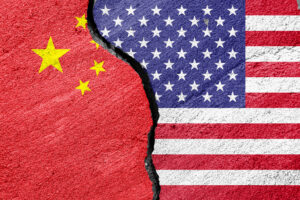Who Would Lose in a Trade War
Cheesemakers in Wisconsin, farmers in the Great Plains, distillers in Kentucky and employees of such iconic American brands as Harley-Davidson and Levi Strauss are all standing in the line of fire.WASHINGTON—If a trade war is coming, the cheesemakers of Wisconsin are standing in the line of fire. So are the farmers of the Great Plains and the distillers of Kentucky. And the employees of iconic American brands like Harley-Davidson and Levi Strauss.
The likelihood of a trade conflagration leapt closer to reality this week after the United States imposed tariff on steel and aluminum imports from Canada, Mexico and the European Union. Infuriated, the jilted U.S. allies vowed to retaliate with tariffs of their own. And in a separate dispute, China is poised to penalize $50 billion in U.S. goods — many of them produced by supporters of President Donald Trump in the America’s agricultural heartland.
“They’re going to hit the farmers,” said Bryan Klabunde, a farmer in northwestern Minnesota. “We want things fair for all industries, but we’re going to take the brunt of the punishment if other countries retaliate.'”
President Donald Trump, who entered office promising to rip up trade deals and crack down on unfair trading practices, is clashing with trading partners on all sides. To the north, he’s taking on Canada; to the south, Mexico; to the east, Europe; across the Pacific Ocean to the west, China and Japan.
“The president seems to be creating trade (and other) disputes with everyone — allies and adversaries alike — and it’s difficult to discern any coherent strategy,” said Rod Hunter, a former National Security Council staffer under President George W. Bush. “The impacts of the disputes have been limited so far, but the economic and political costs will go up as retaliation by trading partners begins in earnest.”
Mexico, for instance, plans to retaliate against the steel and aluminum tariffs by targeting U.S. cheese, among other products.
“It’s our second-largest market,” Jeff Schwager, president of Sartori, a cheese company in Plymouth, Wisconsin, said of Mexico. Retaliatory tariffs “will reduce sales — there’s no question.”
The EU is threatening to penalize Kentucky bourbon and the motorcycles of Wisconsin-based Harley-Davidson. The potential tariffs pack a political punch: They’d hurt constituents of House Speaker Paul Ryan, a Wisconsin Republican, and Senate Majority Leader Mitch McConnell, a Kentucky Republican.
On Friday, reporters in Louisville, Kentucky, asked McConnell if he thought the Europeans were trying to get his attention.
“Well,” the Senate leader said, “they got my attention. They didn’t need to do that. These are our friends. These are not enemies. Canada and Mexico, Europe — these are our allies, and we need to work this out in a way that’s comforting to everyone.”
Ben Steffen, a dairy farmer who also grows corn, soybeans, and wheat on 1,900 acres southeastern Nebraska near Humboldt, is angry about the U.S. tariffs being imposed on America’s closest trade partners and allies.
“I’m upset because it hits me in my pocketbook from multiple angles,” he said. “I sell beef, I sell corn, I sell soybeans and I sell milk. All of those products are vulnerable because we export significant amounts in those markets.”
The milk market has been depressed for about three years, and farmers have struggled to break even. About 14 percent of U.S. milk production is exported; the largest customer is Mexico.
“This is the worst possible thing to have for our milk market, and it’s the same for every other commodity,” Steffen said. ” These are important relationships.”
An even higher-stakes trade dispute is playing out on the Pacific Rim. The United States and China are poised to impose tariffs on up to $200 billion worth of each other’s goods in a battle over Beijing’s strong-arm efforts to overtake U.S. technological supremacy.
Commerce Secretary Wilbur Ross is traveling to Beijing this weekend for talks aimed at preventing an all-out trade war between the world’s two biggest economies. On the Chinese target list are American soybean farmers, who send about 60 percent of their exports to China.
On Friday, Klabunde, who grows corn and soybeans on 3,000 acres near Waubun, Minnesota, spent two nerve-wracking hours with a hired hand, pulling a stuck tractor out of a drainage ditch. They finally got the machine free.
“I think the tariffs and trade war scare me more than a stuck planter,” Klabunde said. “I can lose only so much money on a stuck planter. I can lose a lot more money in a trade war.”
___
Karnowski reported from Minneapolis.
___
Carrie Antlfinger in Milwaukee; Bruce Schreiner in Louisville, Kentucky; and David Pitt in Des Moines, Iowa. contributed to this report.
Your support is crucial…With an uncertain future and a new administration casting doubt on press freedoms, the danger is clear: The truth is at risk.
Now is the time to give. Your tax-deductible support allows us to dig deeper, delivering fearless investigative reporting and analysis that exposes what’s really happening — without compromise.
Stand with our courageous journalists. Donate today to protect a free press, uphold democracy and unearth untold stories.









You need to be a supporter to comment.
There are currently no responses to this article.
Be the first to respond.